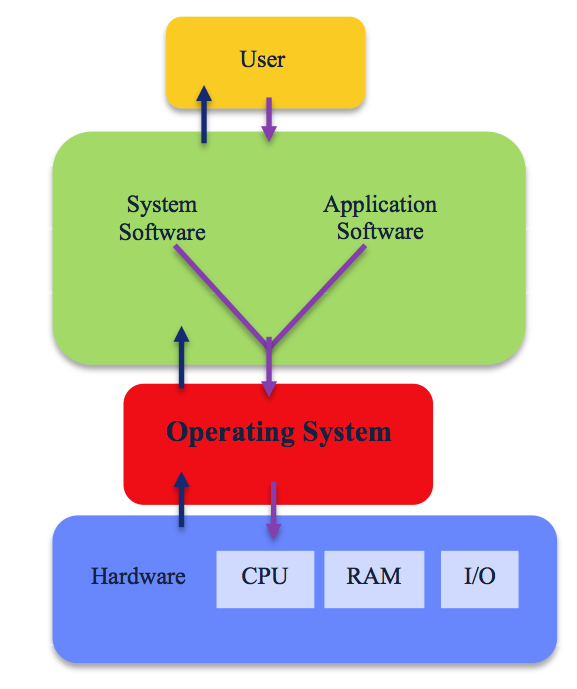This resource will explain how operating systems work, and note the differences between the Microsoft Windows, Mac and Linux operating systems.
What is an operating system?
An operating system is a program that acts as an interface between the computer user and computer hardware, and controls the execution of programs.
The operating system’s job
The operating system (OS) manages all of the software and hardware on the computer. It performs basic tasks such as file, memory and process management, handling input and output, and controlling peripheral devices such as disk drives and printers.
Most of the time, there are several different computer programs running at the same time, and they all need to access your computer’s central processing unit (CPU), memory and storage. The operating system coordinates all of this to make sure each program gets what it needs.

In the image above the User interfaces with the System & Application software. The System & Application software interfaces with the Operating System. The Operating system interfaces with the Hardware. Each of these interfaces are two way transactions with each sending and receiving data.
Types of operating systems
Operating systems usually come pre-loaded on any computer you buy. Most individuals use the operating system that already comes with their computer however it is possible to upgrade or change the initial operating system to suit your preference.
Different operating systems will work in different ways. They may appear visually different, have different terms for common functions and organise programs in different ways. Do not be alarmed if you find yourself using a computer at university that you are unfamiliar with – a bit of practice and you’ll be well on your way!
There are many operating systems that are available however the three most common operating systems are Microsoft’s Windows, Apple’s macOS and Linux. In the table below, we will outline a few of the key differences between each system.
| Microsoft Windows | Mac OS | Linux | |
|---|---|---|---|
|
Pre-loaded Devices |
Microsoft Windows is pre-loaded on all computers except Apple products. |
Mac OS is the pre-loaded OS on all Apple Mac computers. |
Linux is not pre-loaded on many computers, but is free to download. |
|
Customisability |
Minimal changes. |
Minimal changes. |
Highly customisable as it is open source. Huge collaborative community building a range of applications. |
|
Icon |
This is the Start Menu and is located in the bottom left hand corner of the screen it allows you to access your ‘Control Panel’, ‘Computer’, programs, folders and more. You can also shut down your computer using this menu. |
It is located in the top left hand corner of the screen and it is where you can access your ‘System Preferences’, ‘Software Update’, ‘About This Mac’ and more. You can also shut down your computer using this menu. |
These symbols are located in the top left hand corner of the screen and it is where you can access all your computer applications. |
|
Search Tool |
Magnifying glass located in the Start Menu. |
Magnifying glass located in the top right hand corner. |
If using Ubuntu, click on the Circle of Friends icon. |
|
Task Bar |
Located at the bottom of the screen. It contains shortcuts to applications, the date and time, and more. |
Located at the bottom of the screen. It contains shortcuts to applications, files and folders. Referred to as a ‘Dock’. |
Located on the left hand side of the screen with applications running in a vertical manner. It contains shortcuts to applications, files and folders. |
|
Finding Programs |
Start Menu. An application where you can view and organise files and folders. |
Finder. An application where you can view and organise files and folders. |
Dash. The dashboard of Ubuntu where you can view all applications and files. |
|
Default Browser |
Internet Explorer. (Now known as Microsoft Edge for Microsoft Windows 10 version and later) |
Safari. |
Firefox. |
 Windows icon.
Windows icon. Apple icon.
Apple icon.